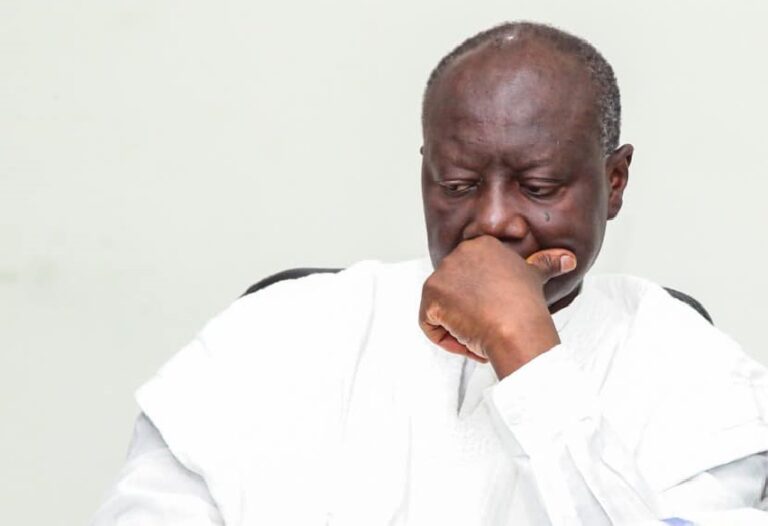Parliament has approved the 2023 Budget Statement and Economic Policy of the government for the year ending December 31, 2022.
The approval came after the House had adopted the motion on the budget document.
The Minister of Finance, Ken Ofori-Atta, moved the motion and requested the House to approve the Budget Statement and Economic Policy after he had presented it to the House on November 24, 2022.
The approval, which is the first stage of budget consideration, paves the way for the House to begin to consider various estimates of ministries, departments and agencies by relevant sector committees.
After that, the House will consider and approve the Appropriation Act to allow the Finance Minister spend the requested amount of funds from the consolidated fund and other public funds.
The approval was preceded by the concluding debates on the budget statement by both the Majority Leader, Osei Kyei-Mensah-Bonsu, and the Minority Leader, Haruna Iddrisu, on the floor of Parliament Tuesday (December 6, 2022).
Soon after the two leaders had ended their debates, the Speaker of Parliament, Alban Sumana Kingsford Bagbin, put a question on the motion twice for those in favour of the motion to say “Ayes” and those against it to say “No”.
With loud “Ayes” in the House, the Speaker ruled that “I think the ‘Ayes’ have it and the House has accordingly approved the Budget Statement and Economic Policy of the government for the year ending December 31, 2023.”
How events out
Contrary to the previous expectation that some Members of Parliament on both sides of the House might drag their feet in endorsing the budget, the development on the floor Tuesday proved otherwise.
There was largely high turnout of MPs, particularly those from the Majority side, as well as Mr Ofori-Atta, in the Chamber today.
Inaccurate figures
Rounding up the debate on the budget, the Minority Leader contested that Ghana’s outstanding public debt was GH₵467.3 billion as presented by the Finance Minister in the 2023 Budget presentation and called for further and better particulars.
He said Mr Ofori-Atta did not report accurately to the House and the people of Ghana when he said the public debt stock was GH₵467.3 billion at $48.8 billion.
Mr Iddrisu said multiplying $48.8 billion by the current exchange rate of GH₵13 would give the country far more than what the Finance Minister presented.
In his view, the minister was disingenuous when rather than using the current exchange rate to do his calculation, he decided to use the rate as of September this year.
“Our debt will not be paid in September. It will be paid either in November, December or probably in 2023. Therefore, the figure is not accurate,” Mr Iddrisu said.
VAT
Touching on a litany of areas in the budget, the Minority Leader served notice to the House it would not help in approving the 2.5 per cent increase in the Value Added Tax (TAX) on moral grounds.
He indicated that if in 1995, President Nana Addo Dankwa Akufo-Addo could describe the introduction of the tax system as immoral then it was also immoral now.
He said the ruling New Patriotic Party (NPP) had no moral right to ask the House to approve of the increments in the current VAT.
“Then the President owes Ghanaians an apology that he was misled and misguided in 1995,” he said.
Mr Iddrisu contested the VAT percentage of 15 per cent, saying that cumulatively the VAT figure could be around 21 per cent.
He said embedded in the tax regime were 2.5 per cent National Health Insurance levy and 2.5 per cent Get Fund levy.
Threshold
Following the current high debt risk of the country, the minority is calling for an additional increase in income threshold of Ghanaians workers to cushion them.
Indeed, given that the current minimum wage at GH₵14 cedis and the cost of a loaf of bread was GH₵25, the Minority Leader said one would have to work for two days to be able to buy a loaf of bread.
“Mr Speaker, as I listened to the Finance minister, I realized that the light at the end of the tunnel has been turned off,” he said.
Patented untruth
Mr Kyei-Mensah-Bonsu said per the 2001 budget statement, the debt to GDP was 140 per cent, with the debt stock in the same period being GH₵9.2 billion.
He said at the time the NDC government was leaving office the debt stock increased to GH120 billion, with percentage increase being 1,299 per cent.
“Mr Speaker, yes the current debt stock is GH₵450 billion but the increase is 268 per cent as against the NDC’s 1,229 per cent and you have the courage to talk to the managers of the economy,” he said.
Taking on the Minority Leader accusing the government of increasing the VAT by 2.5 per cent, Mr Kyei-Mensah-Bonsu said although the economy was not in the best of shape, the government needed to continue with the construction and maintenance of roads.
On exchange rate, he said in 2009, $1 traded for GH₵1.10 but escalated to $1 to GH₵4.35 in 2016, an increase of 300 per cent.
“Today, yes, the exchange rate has gone bad but increase from GH₵4.35 to GH₵13.50 that we are experiencing now is 220 per cent
“Mr Speaker, in spite of the unprecedented shocks both internal and external, head-to-head, the NPP has proved to be managers of this economy and the evidence is clear,” he said.
Source: graphic.com.gh




